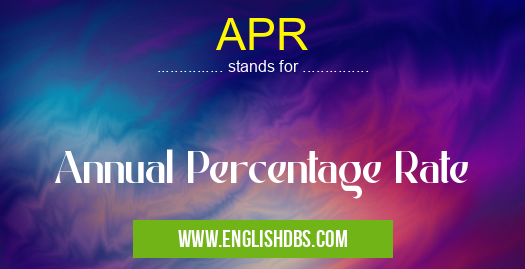What does APR mean in MORTGAGE
APR stands for Annual Percentage Rate. It is a metric used to compare different types of loans, including credit cards and mortgages, so that borrowers can make informed decisions when selecting a loan. APR includes not just the interest rate on the loan but also any fees associated with obtaining it over the lifetime of the loan. Since it encompasses all of these factors, APR is typically higher than an interest rate alone would be.

APR meaning in Mortgage in Business
APR mostly used in an acronym Mortgage in Category Business that means Annual Percentage Rate
Shorthand: APR,
Full Form: Annual Percentage Rate
For more information of "Annual Percentage Rate", see the section below.
Definition
APR stands for Annual Percentage Rate and is a way to measure the cost of borrowing money over an entire year. This figure takes into account both the annual interest rate on the loan as well as any associated fees like points, origination fees, or closing costs. Because it captures all of these factors in one number, APR provides borrowers with an easy-to-understand comparison tool when shopping for loans.
Advantages
The primary advantage to using APR as opposed to just considering interest rates alone is that it provides a more accurate picture of what a borrower will actually pay each year on their loan. Since there may be numerous fees associated with certain types of loans that are not included in traditional interest rates, having this single metric makes comparison shopping much easier for borrowers who want to get the best deal possible. Furthermore, lenders are legally required to disclose APRs so that borrowers have full knowledge of all costs associated with their loans before making any commitments.
Essential Questions and Answers on Annual Percentage Rate in "BUSINESS»MORTGAGE"
What is the APR?
The Annual Percentage Rate (APR) refers to the yearly cost of borrowing money or the rate of interest for a financial product such as a mortgage, credit card or personal loan. The APR includes any associated fees (such as closing costs) associated with the loan. The APR helps you compare different loans by taking into account all associated costs.
How does APR work?
APR is an annualized rate, which means it is calculated over the course of 12 months. It includes fees and other factors related to a loan, so it can give you a more accurate picture than just looking at the interest rate alone. Your lender will use your credit score, income and other data when calculating your APR.
How is APR different from Interest Rate?
An interest rate simply reflects the cost of borrowing money while an Annual Percentage Rate (APR) takes into account any additional fees and charges associated with a loan. In some cases, these additional fees could be thousands of dollars more than just looking at the interest rate alone!
What are some examples of additional fees included in my APR?
Additional fees that are often included in an APR are origination or application fees, document preparation fees, late payment penalties etc.
Is there anything else I should know about APR before making any decisions?
Yes! Always read through documents carefully and make sure you understand all terms and conditions before signing on any dotted line. You may also want to shop around for different lenders to see if you can get a better deal elsewhere!
What if I don't understand my current APR?
Don't hesitate to reach out to your lender if you're having trouble understanding your current annual percentage rate (APR). They will be more than happy to help clarify any points you're confused about.
Does my credit score affect my annual percentage rate (APR)?
Yes, usually lenders consider higher credit scores as lower risk borrowers when deciding on an annual percentage rate (APR) so typically higher credit scores will have access to better rates than those with lower scores.
Are there tax benefits associated with using an Annual Percentage Rate (APR)?
Some types of loans may have tax deductions available depending on your area and situation so it is important to look into that specifically! Contact your local tax advisor if you need further information regarding taxes linked with APRs.
Can I negotiate my Annual Percentage Rate (APR)?
Depending on the lender, it may be possible for you to negotiate on certain aspects such as extra payments or even adjusting one's Annual Percentage Rate (APR), however this largely depends upon individual lending policies — always check with your bank/lender before trying to adjust terms yourself!
What happens if I pay off my loan early?
Generally speaking paying off a loan early has great benefits such as having less total interest paid, shorter term commitments and potential savings due to lower interest rates - but always check this with your lender beforehand as some loans may come along with pre-payment penalties!
Final Words:
In summary, APR stands for Annual Percentage Rate and is a comprehensive metric used when comparing different types of loans such as mortgages or credit cards. By taking into account both the annual interest rate plus other related fees like origination costs and points, APR provides borrowers with an easy-to-understand measure so they can make informed decisions regarding their loan options and get the best deal possible.
APR also stands for: |
|
| All stands for APR |
